- Home
- James David Victor
Escape (Jack Forge, Lost Marine Book 3)
Escape (Jack Forge, Lost Marine Book 3) Read online
Escape
Jack Forge, Lost Marine, Book 3
James David Victor
Fairfield Publishing
Copyright © 2019 Fairfield Publishing
ALL RIGHTS RESERVED. Except for review quotes, this book may not be reproduced, in whole or in part, without the written consent of the author.
This story is a work of fiction. Any resemblance to actual people, places, or events is purely coincidental.
Contents
Chapter 1
Chapter 2
Chapter 3
Chapter 4
Chapter 5
Chapter 6
Chapter 7
Chapter 8
Chapter 9
Chapter 10
Chapter 11
Chapter 12
Chapter 13
Chapter 14
Chapter 15
Thank You
1
Sitting in the command chair and looking down at the image on the main holostage, Jack Forge had an overview of his two-ship flotilla—his frigate and the civilian transport—as they moved across the interstellar void. The frigate was positioned a few kilometers above the civilian transport’s upper hull, a small guardian to the massive civilian vessel.
All was well, relatively speaking. Jack was relaxed for the first time in what seemed like forever; the two-ship flotilla moved easily across the wide expanse; and speed was constant, power distribution performing well. Although the gravity drive was pulling his ships across spacetime at almost unimaginable speeds, the two craft looked stationary, adrift in the black of the void.
The frigate’s drive was functioning at eighty percent efficiency, an impressive number given the beating the little ship had taken. Even though the civilian transport was operating at peak efficiency, its drive was running at low power, only two of its multi-core reactors currently delivering power to the drive systems. At this speed, the frigate could easily hold formation. The two lost ships were doing everything they could to find and catch up to the fleet.
The heading was straight and true, but the fleet rendezvous position was still many lightyears away. Relaxed as he was, he grew more anxious the closer they got. He had been lost for so long and endured so much, it was hard to believe he was so close to rejoining the fleet.
After having been cut off from the fleet and the Fleet Marine service, following the evacuation of Eros, Jack had fought and worked tirelessly to find them. Now that he was so close he felt even more nervous that it might be snatched away, that he might be lost indefinitely, adrift among the stars.
Jack shifted his position in his command chair as the holoimage flickered on the main holostage. The image of the massive civilian transport and the relatively tiny fleet frigate above cut out for a moment before flickering back with jagged lines of a distorted hologram scarring the image. The empty black space around the ships churned with holoshadows.
The holoimage flickered again, the image disappearing for another fraction of a second. With all the action the little ship had seen, Jack was not surprised the systems were getting a little worn out.
“Mr. Bale, check the emitters and the scanner feed to the holostage,” Jack said to Commander Gerat Bale, standing at the sensor console. He was wearing a pair of holospecs and possibly using some recreational program. He took the specs away and set them on the console.
The image flickered again, disappearing before returning with a poor-quality image. Bale ambled over to the central holostage, shaking his head in frustration.
“Surprised anything still works on this ship,” Bale said. “Sooner we get back to the fleet...” Bale let the sentence trail off as he leaned heavily onto the holostage control console. He tapped a few controls and shook his head again as he tried to fix the image.
“Minor course correction from the civilian transport, sir,” Lieutenant Ripa said. She looked up at Jack. “No confirmation from the transport command deck.”
Tapping a few controls on his small armrest holostage, Jack checked the flotilla’s heading. The data displayed in a holoimage just above the armrest. Jack confirmed that the civilian transport had shifted heading slightly. It was not a crime by any means, but Captain Morton aboard the transport usually informed Jack of such maneuvers.
“Match course and speed, Lieutenant,” Jack said. He tapped the armrest control and an image of Captain Morton appeared on the main holostage. It flickered and disappeared as Bale adjusted the settings, attempting to restore the image to its best quality.
“Captain,” Jack greeted Morton.
“How can I help you, Major?” Morton replied.
“You changed course. Everything okay over there?”
Morton looked mildly surprised. “I didn’t order any adjustments.” He tapped away at his own command chair armrest. “Oh, yes. One arc second to port. Maybe a minor asymmetry in the drive. It can sometimes happen when running on a partial core reactor. I’ll check it out. Everything else okay, Major?”
“Yes, just making sure everything was okay. Forge out.”
“The civilian transport has reset its heading, sir,” Ripa said.
“Match her again,” Jack said and leaned back in his chair.
That was the most action Jack had seen in days. He was grateful for the lack of danger, but the monotony of the long-distance flight was becoming tedious. The minor course adjustment just reminded him of how bored he was. Jack climbed down from the command chair and stepped over to the main holostage at the front of the deck.
Having given up trying to restore the image from the control panel, Commander Bale was now sitting on the deck and removing a panel from the base of the holostage so he could access the internal circuitry.
“There is an image display problem,” Bale said. The image flickered again, and the transport and frigate vanished entirely for several seconds before appearing again, the image scarred by poor projection accuracy.
“Let’s take it offline and run a full system diagnostic,” Jack said.
“What? Everything?” Bale said with a sigh.
“Everything, Mr. Bale,” Jack said gently. “From the primary scanner inputs to the secondary holoimage stability matrix.”
Bale rolled his eyes before nodding agreement. “I’ll have to deactivate it for a moment and then reinitialize before I can run the diagnostic.”
Jack knew that Bale just wanted to coast back to the fleet and play holoadventures to pass the time. He was bored and frustrated too, but he knew that during slack times, concentration was even more important. It was too easy to become lazy and distracted when there was little to do. And that made them vulnerable. It was much easier to remain focused when there was a lot to think about, when battle rang in the ears, and danger closed in on all sides. Jack knew from bitter experience that the life of a Marine consisted of long periods of boredom followed by sudden moments of frantic action and complete terror.
Bale shut off the power supply and the image on the holostage vanished.
“It’ll take a few minutes, but we should know the problem by then,” Bale said. “But if you want my best guess, the sensor suite needs a service. Bet some of the nodes need replacing too.”
Jack nodded. The frigate had performed beyond all expectations and was well overdue for a full service. The holostage was a vital tool for the command deck, displaying sensor data as a large 3-D image above the round holostage. With the sensor drones deployed at their maximum range, they could detect a fist-sized object at over a hundred million kilometers away. The holostage could display the image and allow the command deck operator to zoom in and rotate the image. It was a living, evolving map of the surrounding space. It c
ould also display any number of images or data files in the frigate’s main data core. It was the main communication interface providing face-to-face communications with other ships, too.
The holostage was a standard piece of kit. Jack could make it to the rendezvous without it, but he wanted to hand over the ship in as good of condition as he could.
Bale reactivated the holostage. The image of the two ships appeared clean and crisp for a moment and then flickered repeatedly.
“Sir,” Ripa said. “The civilian transport has just made another course adjustment. Three seconds of arc to starboard.”
Jack looked up at the flickering holoimage.
“Turn off that mess of an image, Mr. Bale. Lieutenant Ripa, match the civilian transport’s course and speed.”
Jack walked over to the command chair. As he stepped up, Ripa called out, her voice edged with concern.
“Transport is changing course again, sir. One minute of arc to starboard.”
“Match her, Lieutenant,” Jack said. He opened a channel to Captain Morton on his command chair holostage. The small image above the armrest was flickering and barely watchable.
“Major Forge, we’ve got navigational and sensor issues across the ship.”
“Same here,” Jack said. “We need to scan the surrounding space for any phenomena that might be throwing us off course and interfering with our scanner data.”
No sooner had Jack finished speaking than a sudden collision threw him forward violently. The command chair’s stability field activated just in time and held Jack in place.
“I’ve got it,” Bale said, gripping the sensor console. “Sensor drones show a gravitational anomaly and high-energy particle waves.”
Another collision. Jack felt himself drift in a sudden moment of freefall and then fall back heavily into his chair. Ripa had been knocked off her feet, but she was clambering back up and reaching for her console.
“We’ve run into a massive gamma ray burst,” Bale called out. “Spacetime turbulence is off the chart! What could have caused such a phenomenon? Must be a high-speed collision of a couple of black holes.”
The ship lurched again.
“High-energy particles are frying our sensors. We’ve lost several sensor drones, but I’ve got a pretty good map of the burst.” Bale looked up to Jack. “Sending the data to your command chair now.”
Jack looked at the flickering holoimage data on his armrest. A beam of high-energy subatomic particles with associated turbulence was streaming across space like a raging river of tortured spacetime. It was racing to the frigate from high above on the port side.
The frigate lurched again. Jack heard the shouts of pain from the main deck behind him. Sam Torent had been taking a timeout in a crew bunk. He was now awake and in pain. Jack couldn’t deal with Sam right now, but he knew Sam could take care of himself.
“We have to get across the burst,” Jack said. “We’ll ride it downstream and make for the far side. Lieutenant Ripa, take control, manual piloting. Try and ride the ripples.”
The frigate lurched again. Again, Sam Torent cried out. The cries were prolonged and sustained. Jack had to check on his friend.
“Mr. Bale, send all sensor data to the navigation console,” Jack said, climbing down from his command chair, stumbling as the frigate shook violently. “Recall the sensor drones. We don’t want to lose any more. Use onboard sensors only and find us a smooth path through the spacetime eddies. Assist the lieutenant if you can.”
Jack staggered across the command deck to the exit.
“Sync all our data with Captain Morton. Tell him to follow us down the gamma ray burst. I’m going to check on Commander Torent. You have the command deck, Mr. Bale.”
Jack heard the anguished cries of his old friend. He had never heard Sam cry out in such distress before. They had been through a long and bitter war, they had been attacked by wild animals, beaten by aggressive aliens, but Sam had never before cried out in such pain and torment.
He staggered off the command deck. A collision with another spacetime eddy threw Jack from one side of the corridor to the other. The grav field fluctuated in strength, pulling Jack to the deck and then releasing him, sending him adrift like a helium-filled balloon before restoring the gravity field and pulling him back down again. Jack crawled, floated, and rebounded along the corridor, drawn to the tortured cries of his old friend.
The crew bunk was set in a recess along the side of the main deck, an area reserved for the hail cannon crew to operate. It had been converted into a crew bunk to provide a little privacy. The rough blanket that hung was drifting upward and outward as gravity failed again. Jack saw Sam in his bunk. He was face down, his left arm hanging over the side of the bunk.
As he approached, Jack could see the sweat all over Sam’s bare back, glistening beads that drifted upward as the frigate hit another pocket of spacetime turbulence. Sam looked up at him, his face contorted in pain.
“What is it, Sam?” Jack said.
Sam rolled over onto his back and held up his right arm.
Since Sam had lost his cybernetic arm, all that remained had been the endcap over his residual limb, with the composite neural-cyber connective tendrils hanging uselessly. But after an encounter with a mechanical species of aliens, the Mechs, the tendrils had seemed to grow longer. Now there could be no doubt.
The arm had grown. The neural-cyber composite tendrils were becoming more like the gray sinews of a Mech arm. They were now almost an arm’s length, and they were writhing and thrashing around. The strands appeared metallic, but just like the Mechs, they also had a strange, flesh-like quality.
The frigate lurched again in the spacetime turbulence. Jack saw the gray Mech tendrils grow in another surge as the frigate was bathed in rush of high-energy particles.
Sam grabbed his upper right arm, just above the old endcap that connected him to his old, hated, cybernetic prosthetic. He gripped the arm, trying to squeeze off the pain that wracked his body.
Jack put a hand in Sam’s shoulder. Sam looked up at him in pain and fear. The ship rocked again, and Sam yelled again. The gray tendrils straightened out and grew in another surge. Sam looked at his Mech arm as it grew another fraction.
Sam looked up at Jack, his eyes red with fear.
2
“Hold on, Sam,” Jack said, pressing him back down to the sweat-soaked bunk. “You need a med-pack. I’ll get one now. Just hold on, I’ll be as quick as I can.”
Another quake hit the ship as Jack ran to the stairway down to the lower deck. The med-bay on the lower deck was well equipped. It was fortunate that Jack and his small crew had not needed to use the facilities too frequently.
Jack staggered into the med-bay. He opened a cabinet and pulled out a few med-packs. One should be enough, but he wasn’t taking any chances with the safety of his friend. He grabbed as many as he could carry and then dashed out of the med-bay, a haul of med-packs in his arms and the sound of Sam’s pained cries echoing through the frigate, drawing Jack on as quickly as he could go.
Back at the bunk, Jack tore a pack open. Sam looked longingly at it, knowing it would at least bring pain relief.
Jack held the pack above Sam’s arm. The med-pack let out its mass of fine tendrils from the bottom. He moved it into position over Sam’s arm but wasn’t sure where to apply it. He decided on the joint between Sam’s own arm and the rapidly growing gray tendrils of Mech tissue.
“Major, this is Ripa,” Ripa’s voice came over Jack’s personal communicator. “We are entering the central part of the gamma ray burst. Turbulence is lower, but the particle stream is about to get even higher.”
“Proceed,” Jack said.
And then Sam shouted with renewed distress. The arm grew several centimeters in a single surge and the tendrils became fuller and fatter. As the growth surge subsided, the tendrils threaded around each other before unraveling and growing in another burst.
Sam yelled in agony. His body bucked in pain and he almost t
hrew himself from the bunk. Jack pushed him back down and slapped the med-pack onto his arm.
The fine tendrils from the med-pack were deflected by the gray Mech tissue. A dull gray strand of Mech tissue grew out from Sam’s arm around the place where his bicep would be. The tendrils grabbed the med-pack out of Jack’s hand, wrapping around it in a tightening coil and crushing it before dropping the broken device to the deck. With the med-pack gone, the tendril merged back with the others and joined in their wild thrashing.
Jack and Sam watched in horror as the thickening strands began to form the shape of a human arm, formed from the dull Mech tendrils that increasingly took on the appearance of gray, metallic flesh.
Sam looked at his arm and yelled as a hand formed. He looked up at Jack helplessly. Jack tore open another med-pack and slapped it onto the back of Sam’s neck. The tendrils from the base of the pack found their way to Sam’s neck, burrowing into to his skin and pulling tight.
Sam fell to the bunk in a state of induced sleep. The Mech arm fell still. Jack hoped his old friend wasn’t still experiencing the pain and fear in his unconscious state. For now, he appeared to be calm.
The frigate lurched again. Jack felt himself pulled to the deck as gravity fluctuated wildly. They were through the central beam of the burst and out into the surrounding turbulent spacetime.
Strapping Sam into the bunk, Jack glanced at the gray Mech flesh arm with a mixture of suspicion and horror as it twitched and writhed. With Sam secured and unconscious, Jack headed back to the command deck.
“Is Sam okay?” Ripa said as Jack stepped up to the command chair.
“He is sedated,” Jack said. “Get us through this and back on track as quickly as possible. We need to take Sam to the medical facility on the civilian transport.”

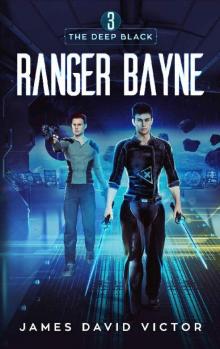 Ranger Bayne
Ranger Bayne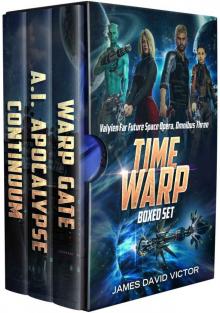 Valyien Boxed Set 3
Valyien Boxed Set 3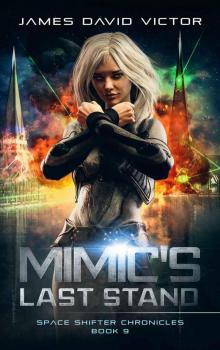 Mimic's Last Stand
Mimic's Last Stand A. I. Uprising (Valyien Book 4)
A. I. Uprising (Valyien Book 4)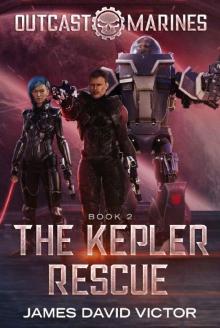 The Kepler Rescue
The Kepler Rescue Last Stand Boxed Set
Last Stand Boxed Set Challenge of Steel
Challenge of Steel Mimic Saves Her People
Mimic Saves Her People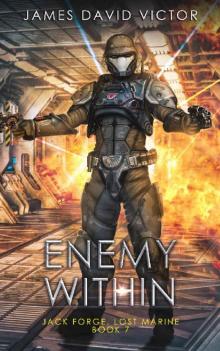 Enemy Within (Jack Forge, Lost Marine Book 7)
Enemy Within (Jack Forge, Lost Marine Book 7)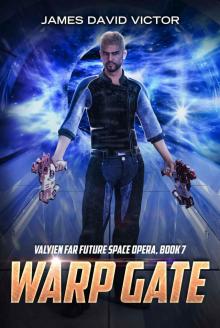 Warp Gate (Valyien Far Future Space Opera Book 7)
Warp Gate (Valyien Far Future Space Opera Book 7)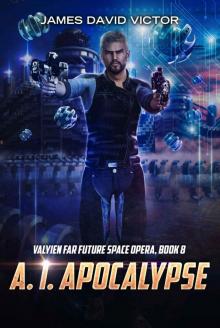 A. I. Apocalypse (Valyien Far Future Space Opera Book 8)
A. I. Apocalypse (Valyien Far Future Space Opera Book 8) Captain Bayne Boxed Set
Captain Bayne Boxed Set Blue Star Marine Boxed Set
Blue Star Marine Boxed Set Night Raiders
Night Raiders Conquest of Earth
Conquest of Earth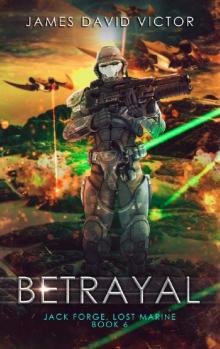 Betrayal (Jack Forge, Lost Marine Book 6)
Betrayal (Jack Forge, Lost Marine Book 6) Sharpe End
Sharpe End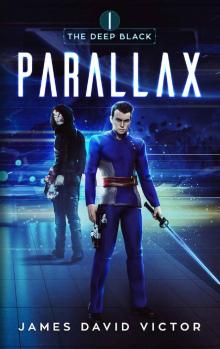 Parallax
Parallax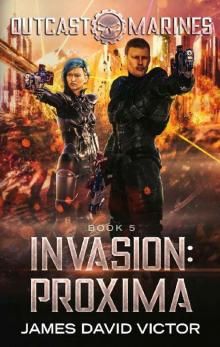 Invasion- Proxima
Invasion- Proxima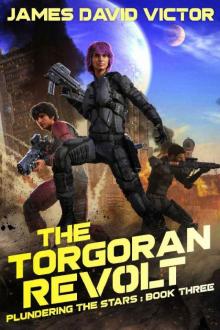 The Torgoran Revolt (Plundering the Stars Book 3)
The Torgoran Revolt (Plundering the Stars Book 3) Outcast Marines series Boxed Set 2
Outcast Marines series Boxed Set 2 Outcast Marines series Boxed Set
Outcast Marines series Boxed Set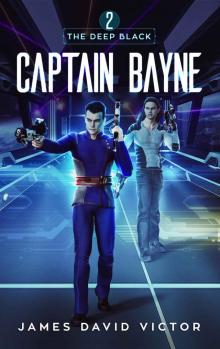 Captain Bayne
Captain Bayne Outcasts of Earth (Outcast Marines Book 1)
Outcasts of Earth (Outcast Marines Book 1)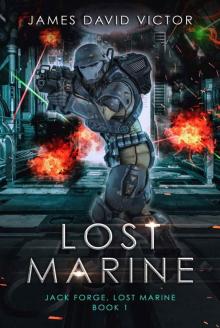 Lost Marine
Lost Marine Eternal Enemy
Eternal Enemy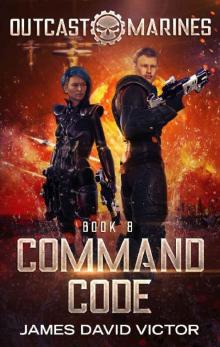 Command Code
Command Code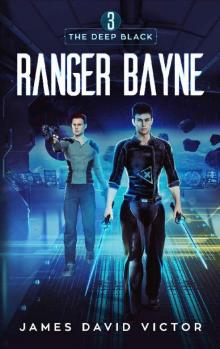 Ranger Bayne (The Deep Black Book 3)
Ranger Bayne (The Deep Black Book 3) Mimic: The Space Shifter Chronicles Boxed Set (Books 1 - 9)
Mimic: The Space Shifter Chronicles Boxed Set (Books 1 - 9) The Deep Black Space Opera Boxed Set
The Deep Black Space Opera Boxed Set Federation at War (Blue Star Marines Book 1)
Federation at War (Blue Star Marines Book 1) AI Uprising
AI Uprising The Xarren Escape (Plundering the Stars Book 2)
The Xarren Escape (Plundering the Stars Book 2) Valyien Boxed Set 1
Valyien Boxed Set 1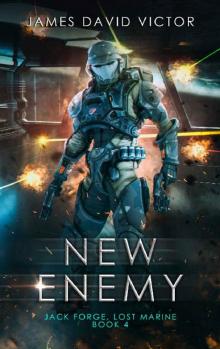 New Enemy (Jack Forge, Lost Marine Book 4)
New Enemy (Jack Forge, Lost Marine Book 4) Alien Legacy
Alien Legacy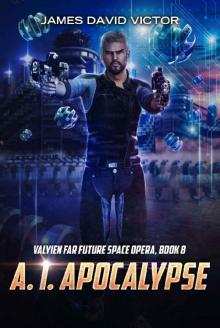 A I Apocalypse
A I Apocalypse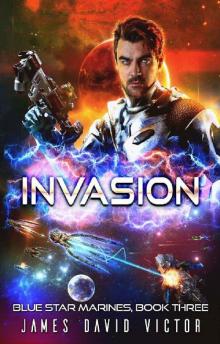 Invasion (Blue Star Marines Book 3)
Invasion (Blue Star Marines Book 3)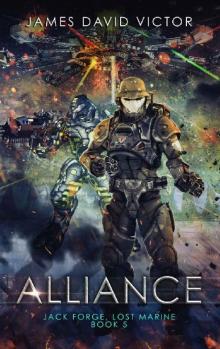 Alliance (Jack Forge, Lost Marine Book 5)
Alliance (Jack Forge, Lost Marine Book 5)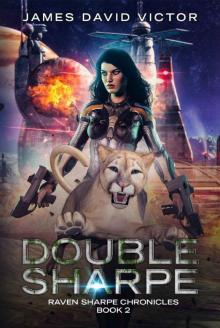 Double Sharpe (Raven Sharpe Chronicles Book 2)
Double Sharpe (Raven Sharpe Chronicles Book 2)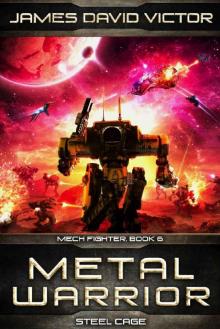 Metal Warrior: Steel Cage (Mech Fighter Book 6)
Metal Warrior: Steel Cage (Mech Fighter Book 6)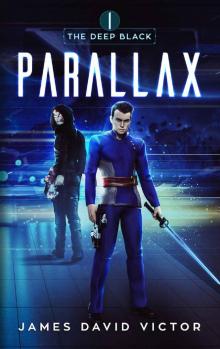 Parallax (The Deep Black Book 1)
Parallax (The Deep Black Book 1)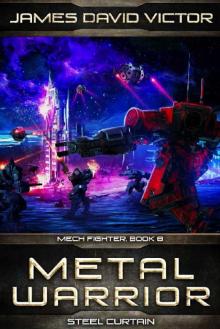 Metal Warrior: Steel Curtain (Mech Fighter Book 8)
Metal Warrior: Steel Curtain (Mech Fighter Book 8)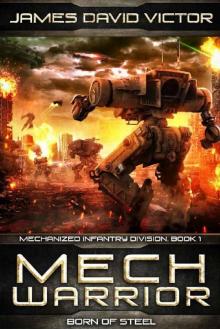 Mech Warrior: Born of Steel (Mechanized Infantry Division Book 1)
Mech Warrior: Born of Steel (Mechanized Infantry Division Book 1) Outcast Marines Boxed Set
Outcast Marines Boxed Set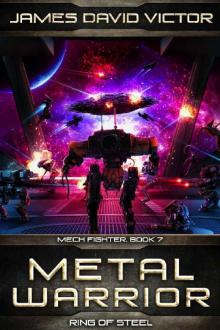 Metal Warrior: Ring of Steel (Mech Fighter Book 7)
Metal Warrior: Ring of Steel (Mech Fighter Book 7) The Elarri Heist (Plundering the Stars Book 1)
The Elarri Heist (Plundering the Stars Book 1)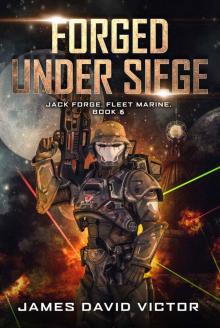 Forged Under Siege (Jack Forge, Fleet Marine Book 6)
Forged Under Siege (Jack Forge, Fleet Marine Book 6)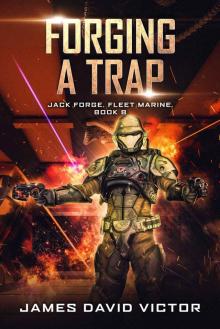 Forging a Trap (Jack Forge, Fleet Marine Book 8)
Forging a Trap (Jack Forge, Fleet Marine Book 8) Daikon (ESS Space Marines Book 2)
Daikon (ESS Space Marines Book 2) Mimic Changes the World
Mimic Changes the World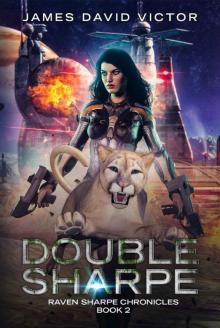 Double Sharpe
Double Sharpe Invasion- Pluto
Invasion- Pluto Mimic and the Fight for Freedom (Space Shifter Chronicles Book 3)
Mimic and the Fight for Freedom (Space Shifter Chronicles Book 3)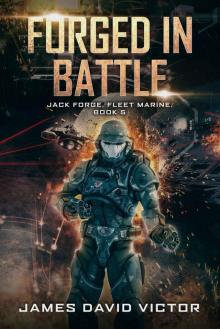 Forged in Battle (Jack Forge, Fleet Marine Book 5)
Forged in Battle (Jack Forge, Fleet Marine Book 5) Lykos (ESS Space Marines Book 6)
Lykos (ESS Space Marines Book 6)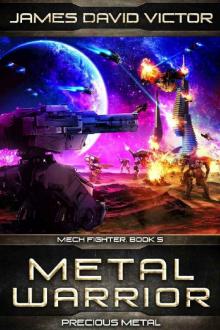 Metal Warrior: Precious Metal (Mech Fighter Book 5)
Metal Warrior: Precious Metal (Mech Fighter Book 5) Forged to Hunt
Forged to Hunt Earth Space Service Space Marines Boxed Set
Earth Space Service Space Marines Boxed Set Alpha Rises
Alpha Rises Power of the Seers (Dragon Oracle Book 4)
Power of the Seers (Dragon Oracle Book 4)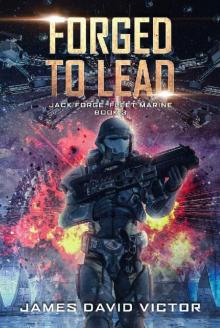 Forged to Lead (Jack Forge, Fleet Marine Book 3)
Forged to Lead (Jack Forge, Fleet Marine Book 3) Nebula (ESS Space Marines Book 4)
Nebula (ESS Space Marines Book 4)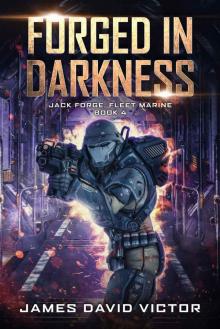 Forged in Darkness
Forged in Darkness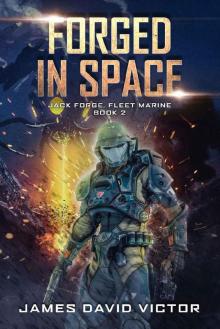 Forged in Space
Forged in Space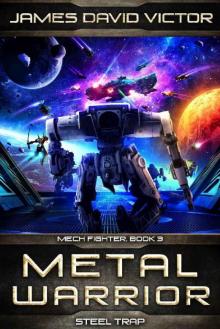 Metal Warrior: Steel Trap (Mech Fighter Book 3)
Metal Warrior: Steel Trap (Mech Fighter Book 3) Mimic and the Space Engineer Boxed Set, Books 1 - 3
Mimic and the Space Engineer Boxed Set, Books 1 - 3 World Breaker Boxed Set (ESS Space Marines Omnibus Book 3)
World Breaker Boxed Set (ESS Space Marines Omnibus Book 3)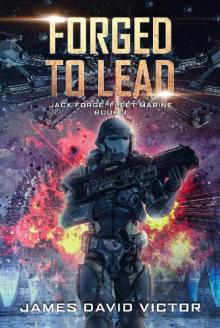 Forged to Lead
Forged to Lead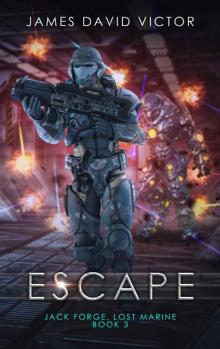 Escape (Jack Forge, Lost Marine Book 3)
Escape (Jack Forge, Lost Marine Book 3)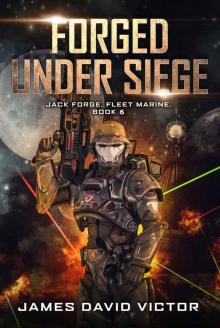 Forged Under Siege
Forged Under Siege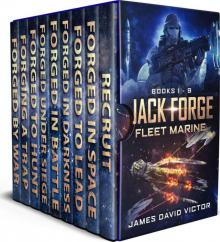 Jack Forge, Fleet Marine Boxed Set (Books 1 - 9)
Jack Forge, Fleet Marine Boxed Set (Books 1 - 9)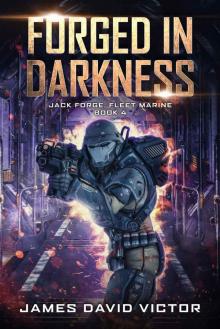 Forged in Darkness (Jack Forge, Fleet Marine Book 4)
Forged in Darkness (Jack Forge, Fleet Marine Book 4) Insurrection
Insurrection Mimic Betrayed (Space Shifter Chronicles Book 6)
Mimic Betrayed (Space Shifter Chronicles Book 6) Mimic Goes to War (Space Shifter Chronicles Book 5)
Mimic Goes to War (Space Shifter Chronicles Book 5)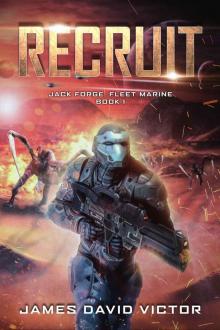 Recruit (Jack Forge, Fleet Marine Book 1)
Recruit (Jack Forge, Fleet Marine Book 1) Mimic Betrayed
Mimic Betrayed Power of the Seers
Power of the Seers Mimic and the Journey Home (Space Shifter Chronicles Book 2)
Mimic and the Journey Home (Space Shifter Chronicles Book 2)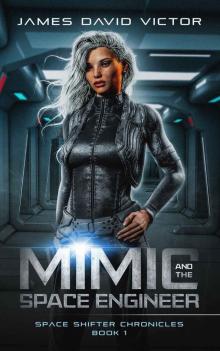 Mimic and the Space Engineer (Space Shifter Chronicles Book 1)
Mimic and the Space Engineer (Space Shifter Chronicles Book 1)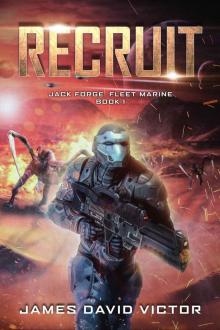 Recruit
Recruit Forged to Hunt (Jack Forge, Fleet Marine Book 7)
Forged to Hunt (Jack Forge, Fleet Marine Book 7)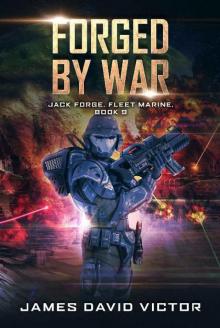 Forged by War (Jack Forge, Fleet Marine Book 9)
Forged by War (Jack Forge, Fleet Marine Book 9)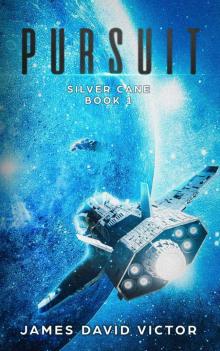 Pursuit (Silver Cane Book 1)
Pursuit (Silver Cane Book 1) Zenith (ESS Space Marines Book 1)
Zenith (ESS Space Marines Book 1) Star Chaser (ESS Space Marines Book 3)
Star Chaser (ESS Space Marines Book 3)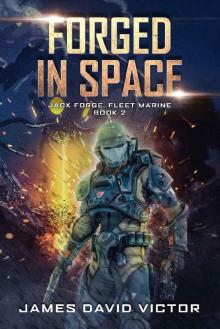 Forged in Space (Jack Forge, Fleet Marine Book 2)
Forged in Space (Jack Forge, Fleet Marine Book 2) Defense (Silver Cane Book 2)
Defense (Silver Cane Book 2) Infiltrate (Silver Cane Chronicles Book 3)
Infiltrate (Silver Cane Chronicles Book 3) Alpha Rises (Valyien Book 2)
Alpha Rises (Valyien Book 2) Mimic Raises an Army
Mimic Raises an Army Alien Evolution (Valyien Book 3)
Alien Evolution (Valyien Book 3) Arkana (ESS Space Marines Book 4)
Arkana (ESS Space Marines Book 4) Lykos
Lykos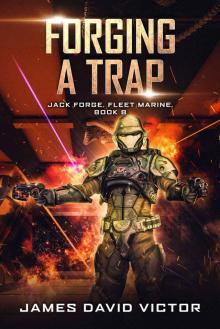 Forging a Trap
Forging a Trap Mimic Goes to War
Mimic Goes to War Earth Space Service Boxed Set: Books 1 - 3 (ESS Space Marines Omnibus)
Earth Space Service Boxed Set: Books 1 - 3 (ESS Space Marines Omnibus) Stranded (ESS Space Marines Book 7)
Stranded (ESS Space Marines Book 7) Mimic Raises an Army (Space Shifter Chronicles Book 4)
Mimic Raises an Army (Space Shifter Chronicles Book 4) Alien Evolution
Alien Evolution